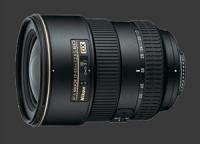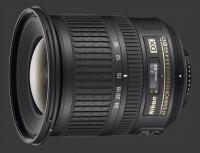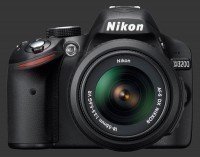Nikon D3200 Review
Nikon D3200 Performance - How well does it take pictures?
Ultimately, it is image quality that makes a camera worth buying. For an SLR, image quality greatly depends on the lens. While color, noise, exposure and dynamic-range are properties of a camera, distortion, vignetting and chromatic aberrations are properties of the lens. Sharpness and contrast depend on the weakest link. That is, the camera cannot capture more details than the lens lets through. Conversely, it is quite possible for a lens to transmit more details than the sensor can capture.
Note that the 24 megapixels sensor of the D3200 is very demanding and requires a lens with an great resolving power. This means one of Nikon's premium lenses instead of a typical kit-lens which should be avoided at all costs. With the Nikkor AF-S DX 17-55mm F/2.8G IF-ED
Nikkor AF-S DX 17-55mm F/2.8G IF-ED, the D3200 produced very good results as early as F/4. The ultra-wide Nikkor AF-S DX 10-24mm F3.5-4.5G ED
Nikkor AF-S DX 10-24mm F3.5-4.5G ED, which was also used for this review, fared less well, leaving significant softness along edges of images.

The D3200 has a revised metering system which is definitely the weak-point of this camera. It does exposure correctly scenes of limited dynamic-range but frequently severely over-exposes the sky and other bright areas which do not fall near the center of the frame. Under-exposure also happens but much less often. Hundreds of images taken resulted in over-exposure of 1-2 EVs, and sometimes higher. This may be a more consumer oriented approach when ensures a bright centrally-located subject but will surely result in disappointing photos.
There are 6 Picture Control styles, each can be modified in terms of sharpness, contrast, brightness, saturation and hue. The Standard setting provides the most realistic rendition but some colors are noticeably off. A Hue of -1 and Contrast of +1 produces more pleasing results. The Neutral mode provides a softer and less contrasty look, while both Landscape and Vivid modes show over-the-top-colors not suitable to represent reality. At its default, sharpness is a little soft, increasing it by one to 3 improves things without introducing artifacts.
The white-balance system performs well. Preset and custom white-balance are very accurate. Automatic white-balance is good but not perfect. In broad daylight, there is little to complain about but it tends to leave a cast under artificial light. Most times, the cast is gentle but it is occasionally completely off.
Noise levels are surprisingly low until ISO 400 and barely noticeable at ISO 800. By ISO 1600, a hint of color noise starts appears but considering a whopping 24 megapixels of resolution, this is unlikely to be visible in most common print sizes. As usual, noise increases steadily at each additional stop. Still, ISO 3200 and 6400 are very usable for mid-size prints. The expanded ISO 12800 setting is a stretch but remains usable for small 4x6 prints and web use.

The Nikon D3200 is quick and responsive at all times. Nearly all operations except for autofocus are instant, including the shutter lag. While it cleans the sensor by default at power on and off, it takes only one second to shoot from the moment the camera is powered on. A slower and more effective cleaning procedure can be activated manually from the setup menu. Playback is quick and moving between images happens without delay. The camera returns to shooting mode instantly when the shutter is pressed halfway.
In operation, the Nikon D3200 is very responsive with two exceptions. Almost all operations are nearly instant, including the critical shutter-lag. Power-On is fast and the camera is ready to shoot in an instant, assuming the automatic sensor-clean on Power-On is disabled. It can be set to be activated on Power-Off instead. Going from on image to t he next in Playback mode is one of the slow operations. It takes about one second as the image slides into view. Luckily, the sliding animation can be disabled which speeds things up.
The one slow thing already mentioned is a one second lag before video recording starts. The other slow aspect is autofocus which is relatively good for this class of DSLR but certainly lags behind that of higher-end cameras. In good light and with a fast lens, the D3200 locks focus in about ¼s but typically it takes between ½s and ¾s. In low-light it can take up to 1s to focus but it manages to accurately lock under low-power illumination.
The continuous drive runs constantly at 4 FPS and can shoot up to 100 consecutive JPEG images with a fast card. Nikon does not specify a buffer-depth for RAW images but we managed 6 before slowing down. Battery-life is just below average for this class of camera but, at 540 shots-per-charge, a single battery should be good enough for a typical day of shooting.
Nikon D3200 Performance - How well does it shoot video?
The Nikon D3200 can 1920x1080, which is knows as 1080p or Full HD, at 30 or 25 FPS. 30 FPS is the frame-rate used by North American televisions, while films are usually filmed at the slower 24 FPS rate. A faster 60 FPS frame-rate which renders motion extremely smoothly is also available at 1280x720, also known as 720p. Zoom and Manual Focus are usable while filming, which is normal since these are mechanically-controlled on virtually all DSLR cameras. Like the D3100 before it, the D3200 also adds is contrast-detect autofocus.
The D3200 has a sensitive built-in mono microphone which records sounds from both outside and inside the camera. This unfortunately includes the sound made by the autofocus mechanism. Unlike its predecessor, the D3200 supports external stereo audio via a standard mini-jack input. When using the built-in microphone, it is therefore best to focus manually while filming with sound. This is easier said than done and requires a good amount of practice to get right. AF noise certainly varies by lens and the Nikkor AF-S DX 17-55mm F/2.8G IF-ED
Nikkor AF-S DX 17-55mm F/2.8G IF-ED used was relatively quiet.
In single-shot (AF-S) mode, the shutter-release activates autofocus either before or during filming. If you must use autofocus, this is the best mode to use it in. Very few digital cameras can work this way. There are two advantages to this:
- It is easy to make sure the camera focuses on the desired subject. Each time the subject changes, simply refocus using the shutter-release.
- The lens only makes noise at specific and controlled times. In other words, only when the shutter-release is pressed halfway.
In continuous autofocus (AF-C) mode, the lenses focuses constantly. This causes two problems:
- Continuous noise from the camera lens. Each time there is a slight movement of the subject, the camera refocuses which causes noise to be recorded by the internal microphone.
- Very often the camera will focus at the wrong distance. As the subject moves across the frame, the camera can easily get confused and focus at the background or the wrong subject.
The way contrast-detect autofocus works, it moves the lens back and forth to find the distance at which focus points have the highest contrast. To do this, it must focus too close and too far first. This is not a problem for photography since this all happens before taking a picture. During video recording this causes a disturbing back and forth movement in videos. The bottom line is that the advancement of having DSLR cameras record video with autofocus borders on useless in its current form.

The lack a dedicated video mode normally causes two issues: The inability to accurately setup framing and the camera not being ready to record video. The D3200 addresses the former by providing a display mode which darkens the outside of the video-recording area which has a 16:9 aspect ratio, compared to the 3:2 aspect of still images. The latter issue if present in the D3200 and a delay of 1s occurs when starting to record video. Recording stops instantly though.
Video quality from the Nikon D3200 is very good. The camera captures plenty of details and motion is recorded smoothly. A bright view is usually maintained and the preview is generally accurate. Exposure is automatic with the use of EC being possible while filming. Keep in mind that shutter-speeds during filming are limited by the frame-rate, so EC has limited latitude. Videos are saved in Quicktime format with the efficient H.264 codec.
The internal microphone has adjustable sensitivity in 20 steps. It can be very sensitive and, in that case, will record all camera operations, including autofocus and using EC, loud and clear. Ideally a separate sound-recording device should be used and the audio track merged with silent video in software. It obviously requires more work, but is sure to significantly provide a better viewing experience.
Nikon D3200 Conclusion
The Nikon D3200 raises the bar for entry-level cameras. Its 24 megapixels sensor delivers sufficiently high-quality output to make poster-sized prints at low ISO and remains very usable until its maximum standard sensitivity of ISO 6400. As a Nikon DSLR, this model gives users access to the second largest lens lineup of the industry, ensuring tremendous flexibility. This 24 MP resolution DSLR is also very competitively priced but remember that to take truly advantage of the high resolution, sharp and expensive are a must.
This DSLR remains quite responsive in use. The autofocus is nothing to write home about but the camera rarely gets in the way of photography. In terms of output, there is only one disappointing aspect and that is the metering system which is prone to significant over-exposure. This is the only aspect to prevent the D3200 from obtaining our highest camera rating. White-balance is not perfect either but can easily be corrected.
Video from the Nikon D3200 is very nice. Outside of the one second delay at the start of recording, it manages to preview framing correctly and captures video with smooth motion and crisp details. There are plenty of video features for an entry-level model, including stereo sound input and adjustable microphone sensitivity. Autofocus is possible while recording too for those who feel the need.
Both feature set and ergonomics are very reasonable for an entry-level DSLR. Pros will feel limited but novices will not find this camera daunting. Its more advanced features like spot-metering and white-balance fine-tuning make nearly any desired result achievable. Luckily for advanced photographers, the Nikon D3200 supports an optional remote-trigger which get around the annoyance of the self-timer which resets itself between shots.
In the end, the D3200 proves to be a very capable camera with truly excellent output but one flaw which requires additional effort to get around. Those who use spot-metering or Manual exposure most of the time are unlikely to be affected but the auto-exposure system is sure to trip up beginners.
 |
Please Support Neocamera
All information on Neocamera is provided free of charge yet running this website is a huge endeavor. Purchases made via affiliate links found throughout the site help keep it running and up-to-date. There is no additional cost to you, so please consider buying via these links to our affilates:
If you found any information on this site valuable and did not purchase via our affiliate links, please considering donating via PayPal:
Any amount will be greatly appreaciated. Thank you for your support!
Nikon D3200 Highlights

Sensor-Size: 24 x 16mm

Actual size when viewed at 100 DPI
| 24 Megapixels DSLR | ISO 100-12800 |
| Nikon F Mount 1.5X FLM | Shutter 1/4000-30s |
| 95% Coverage Small Viewfinder | Full manual controls, including Manual Focus |
| Built-in Dust Reduction | Custom white-balance |
| 4 FPS Drive, 100 Images | Spot-Metering |
| 1920x1080 @ 30 FPS Video Recording | Hot-Shoe |
| 3" LCD 920K Pixels | Stereo audio input |
| Lithium-Ion Battery | |
| Secure Digital Extended Capacity |
Updates
2025.01.18

Fujifilm GFX 2025 Lens Roundup
Lens Review roundup of Fujifilm GFX Medium-Format lenses. Quality, performance and handling of the GF20-35mm F/4R WR, GF30mm F/3.5 Tilt-Shift and the GF55mm F/1.7.
2024.11.18

Best 2024 Photography Gifts for Every Budget
Great gifts for photographers and photo enthusiasts selected for every budget among the best products of 2024.
2024.08.07

Eye Protection Tips for Professional Photographers
The four main considerations for professional photographers regarding eyewear.
2024.07.14

Fujifilm X100VI Review
Flagship fixed-lens compact digital camera with a 40 MP sensor and Image-Stabilization, a first for the series. Retro design featuring dual control-dials, plus direct ISO, Shutter-Speed and EC dials. Its hybrid viewfinder can switch between EVF and OVF mode.
2024.05.09

Fujifilm GFX100 II Review
Flagship 102 Megapixels Medium-Format Mirrorless Digital Camera with 8-Stop 5-Axis IBIS, 8 FPS Drive, 8K Video and 400 MP Super-Resolution capture in a weatherproof and freezeproof body with dual control-dials and dual memory-card slots.
2024.04.03

Fujifilm X-T5 Review
Newest Fujifilm flagship boasting a 40 MP APS-C sensor, 5-axis IBIS with 7-stop efficiency, 15 FPS continuous drive, 6.2K Video capture, dual control-dials and dual SDXC UHS-II slots in a sturdy weatherproof and freezeproof body.
2023.11.20

Best Digital Cameras of 2023
Find out which are the Best Digital Cameras of 2023. All the new Mirrorless Digital Cameras from entry-level to high-end professional.
2023.07.10

Fujifilm X-H2 Review
40 Megapixels APS-C Hybrid Mirrorless Digital Camera with 7-stop IBIS. Fastest shutter ever and 8K video capture. Large builtin EVF with 0.8X magnification and 5.8 MP, plus an Eye-Start Sensor. Packed with features and large number of controls in a weatherproof and freezeproof body.
2023.05.07

Sony FE 20-70mm F/4G Review
Review of the unique Sony FE 20-70mm F/4G lens. The optical zoom of this lens spans ultra-wide-angle and medium focal-length coverage, making it one of the most versatile Full-Frame lenses on the market.
2023.01.15

Huion Inspiroy Dial 2 Review
Review of the Huion Inspiroy Dial 2 tablet, a medium sized drawing surface with dual dials and customizable buttons. Connects via USB-C or Bluetooth 5.0 with Windows, Linux and Android support.
2022.12.08

How to Pack for a Photo Trip
Find out how to pack for a travel photography trip, carry your gear safely while meeting airline regulations.
2022.11.13

Best Digital Cameras of 2022
The best digital cameras of 2022. A short list of the most outstanding models in their respective categories. Choose one for yourself or as a gift.












